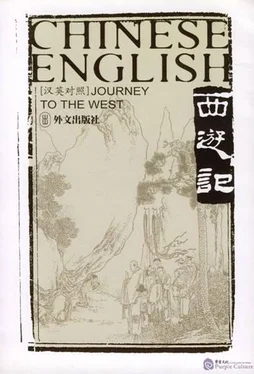“It's most unreasonable to ask that,” Sanzang replied, “when my horse has only this moment stopped and I haven't even had the time to take my foot out of the stirrup.”
“But you've been a monk since childhood, venerable sir,” said Monkey. “You were taught Confucian books before you studied the sutras and the dharma. You're very widely educated and on top of that you've been shown great kindness by the Tang Emperor. So how come you can't read those great big letters over the gate?”
“You stupid macaque,” cursed the venerable elder, “you don't know what you're talking about. I was urging my horse Westwards and had the sun in my eyes. Besides, the letters are hidden by the dust. That's why I didn't see them.” At this Monkey bowed, made himself over twenty feet tall, wiped the dust away with his hand, and invited his master to read them. There were five words written large: IMPERIALLY FOUNDED PRECIOUS WOOD MONASTERY. Monkey resumed his normal size and asked the master which of them was to go into the monastery to ask for lodging.
“I will,” said Sanzang. “You are all so ugly, coarsely spoken, abrasive and overbearing that you might give the monks here such a fright that they refused to shelter us. That would be no good.”
“In that case, Master,” replied Monkey, “enough said. Please go in.”
Sanzang laid down his monastic staff, removed his cape, neatened up his clothes, put his hands together and went in through the monastery gates. Behind red lacquered railings on either side two vajrapani guardian gods sat on high. These statues were both majestic and hideous:
One's iron face and steel whiskers seemed to be alive,
The other's scorched brow and bulging eyes were exquisitely carved.
On the left were fists knobbly like pig iron,
To the right were hands as rough as copper ore.
Their golden chainmail gleamed in the light,
Helmet and embroidered sash floated in the breeze.
Many worship the Buddha in the West;
Red glows the incense in stone tripods.
When Sanzang saw these statues he nodded, sighed and said, “If we had people in the East who could make big statues like these to burn incense to and worship I'd never have needed to go to the Western Heaven.” With more sighs he went through the inner gates of the monastery, where could be seen statues of Four Heavenly Kings, Dhrtarastra, Vaisravana, Virudhaka and Yirupaksa, set to the East, North, South and West to ensure the proper amounts of wind and rain. Once inside the inner gates he saw four lofty pines, each with a spreading canopy shaped like a parasol. He suddenly looked up to see the main Buddha hall. Placing his hands together in homage he prostrated himself before the images, then rose, walked round the platform on which the Buddha statues sat, and went out by the back door. He saw that at the back of the Buddha statues was one of the Bodhisattva Guanyin saving all beings in the Southern Sea. The craftsmanship was superb: there were figures of shrimps, fish, crabs, and turtles with heads and tails emerging from the composition as they leapt and played in the ocean waves.
The venerable elder nodded several more times, and sighed over and over again, “Oh dear! If all the creatures of scale and shell worship the Buddha, why is it that man alone will not live virtuously?”
As he sighed a monk came out through the innermost gate. Seeing Sanzang's remarkable and distinguished appearance he hurried up to him, greeted him courteously, and said, “Where are you from, reverend sir?”
“I have been sent by His Majesty the Tang Emperor,” Sanzang replied, “to worship the Buddha in the Western Heaven and fetch the scriptures. As we have reached your illustrious monastery at evening I request that we be allowed to spend the night here.”
“Reverend Sir,” said the monk, “please don't be angry with, me, but it's not for me to decide. I'm just a lay brother who sweeps and strikes the bell and does menial duties. We have a reverend abbot inside who is in charge here and I'll have to report to him. If he allows you to stay I'll come out again with an invitation, but if he doesn't then I'm afraid I won't be able to waste any more of your time.”
“Thank you for your trouble,” said Sanzang.
The lay brother hurried inside to report to the abbot, who was also the superintendent of ecclesiastical affairs, “There's someone outside, sir.” The abbot rose, dressed himself in his miter and his vestments, and quickly opened the doors to let him in.
“Where is he?” he asked the lay brother.
“Can't you see him over there, behind the main hall?” the lay brother replied.
Sanzang, who was leaning against the gateway, was bareheaded and wearing a monastic habit made of twenty-five strips of cloth and a pair of dirty, water-stained Bodhidharma sandals. At the sight of him the abbot said to the lay brother, “You need a lot more floggings yet, brother. Don't you realize that I hold high office in this monastery and only receive the gentry who come from town to burn incense here? How could you be so empty-headed as to ask me to receive a monk like that? Just look at his face. You can see he isn't honest. He's probably a wandering mendicant monk asking for lodging here because it's late. Our lodgings are not to be disturbed by the likes of him. He can spend the night squatting under the eaves. Why tell me about him?” With that he turned and walked away.
Sanzang, who heard all this, had tears running down his face. “Alas,” he said, “alas. How true it is that 'a man away from home is dirt.' I have been a monk since I was a boy. I have never
'Absolved the dead when eating meat
Or thought of doing harm,
Or read the Sutras angrily,
Or reflected without calm.
Nor have I
Thrown roof tiles, or heaved a brick
To harm a temple building,
Or ever scraped from arhat's face
The very precious gilding.
Oh dear! Goodness only knows in what existence I did such harm to Heaven and Earth that I should always be meeting evil people in this one. Even if you will not give us a night's lodging, monk, why did you have to say such disgraceful things, and tell us to squat under the front eaves? It's a good thing you said nothing like that to Wukong. If you had he would have come in here and smashed your feet with his iron cudgel.”
“Oh well, never mind,” thought Sanzang. “As the saying goes, manners maketh man. I'll go in, ask him and see what he decides.”
The Master walked in through the gate to the abbot's lodgings, where he saw the abbot sitting with his outer clothes off and seething with fury. Sanzang did not know from the pile of paper on his table whether he was reading scripture or writing out Buddhist pardons for somebody.
Not venturing to go any further in, Sanzang stood in the courtyard, bowed, and called aloud, “My lord abbot, your disciple pays his respects.”
The monk, apparently very irritated that he had come in, barely acknowledged his greeting and asked, “Where are you from?”
To this Sanzang replied, “I have been sent by His Majesty the Great Tang Emperor to worship the living Buddha in the Western Heaven and fetch the scriptures. It was because I have reached your illustrious monastery at nightfall that I have come to ask for lodging. I'll leave before first light tomorrow. I beg, venerable abbot, that you will show me kindness.”
Only then did the abbot make a slight bow and ask, “Are you Tang Sanzang?”
“Yes, I am.”
“If you are going to the Western Heaven to fetch the scriptures, how is that you don't know the way?”
“I've never been here before,” said Sanzang.
“About a mile and a half to the West is Ten Mile Inn,” said the abbot, “where they sell food and you can put up for the night. It would not be convenient for you monks from far away to stay here.”
Читать дальше









